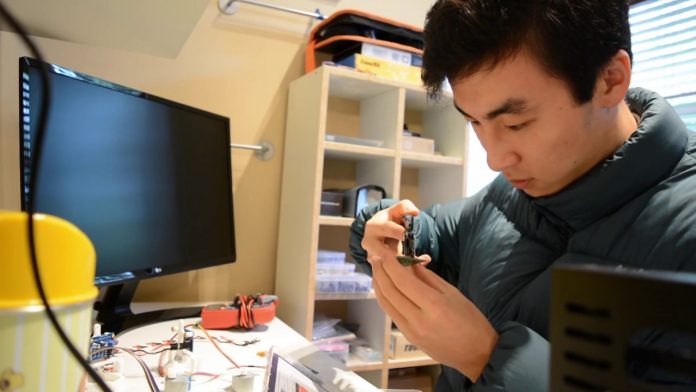A UBC student has put his education to a very personal use, designing a new system that allows his special needs brother to control his wheelchair.
Watching his older brother Daniel struggle with Duchenne muscular dystrophy—a disease that progressively weakens the muscles and eventually leaves the individual unable to walk—is one of the hardest things UBC student Michael Ko has ever had to do in his life.
In response, Michael, currently in his fourth year in UBC’s engineering physics program, turned to technology and his knack for invention to help his brother do simple tasks and find a measure of enjoyment in life.
Daniel, now 28, was diagnosed with the condition as a child and needed a wheelchair by age eight. Two years ago, he started having difficulties speaking following an operation that involved his vocal chords. This meant that Google Assistant, which he relied on to manipulate his environment, could no longer recognize his commands.
“Due to Daniel’s physical challenges, being able to use Google Assistant to play music and do other things is very important,” says Michael. “I realized that with a voice-assistive device he could continue using Google Assistant and keep some of his independence.”
Fired up with the idea, Michael taught himself basic programming and electrical engineering throughout the summer of 2018, relying mainly on YouTube videos and trial and error to build a controller that responds to Daniel’s voice. As a result, Daniel was able to access Google Assistant by saying an easy keyword, instead of having to enunciate “Hello Google” or “Okay Google.”
A year later, a new challenge came along when Daniel’s arms got weaker and he found it increasingly difficult to operate his wheelchair.
“This chair is important to our family and we’ve made many good memories with it,” says Michael. In the past, while using the electric wheelchair, his brother could join family dinners, go out to meet friends or enjoy a visit to the mall.
Once again, Michael set to work, diving deep into voice recognition programming to build a voice-activated micro-controller that operates Daniel’s wheelchair when given simplified vocal commands.
Along with programming the software, Michael designed the joystick controller and mount, figuring out how to manipulate the wheelchair’s joystick using mechanical motions and making all the electrical connections work.
The family now calls the setup Eva, after a character in one of the brothers’ favourite films, Wall-E. Eva is built to recognize simple commands, turning left when Daniel calls out “Eva, L” or going right when he says “Eva, R.”
Eva may well be the first personalized voice-operated wheelchair, but Michael is less concerned about accolades and more intent on helping people like his brother, who face incredibly difficult situations in their day-to-day lives. With two years left in his program at UBC’s faculty of applied science, he’s looking forward to learning as much as he can about engineering and computer science in order to develop more assistive devices in the future.
“Sometimes the challenges we face can seem overwhelming,” says Michael, “but at the same time I think it’s important to remember that we can always try our best to overcome them and that eventually, we will.”















